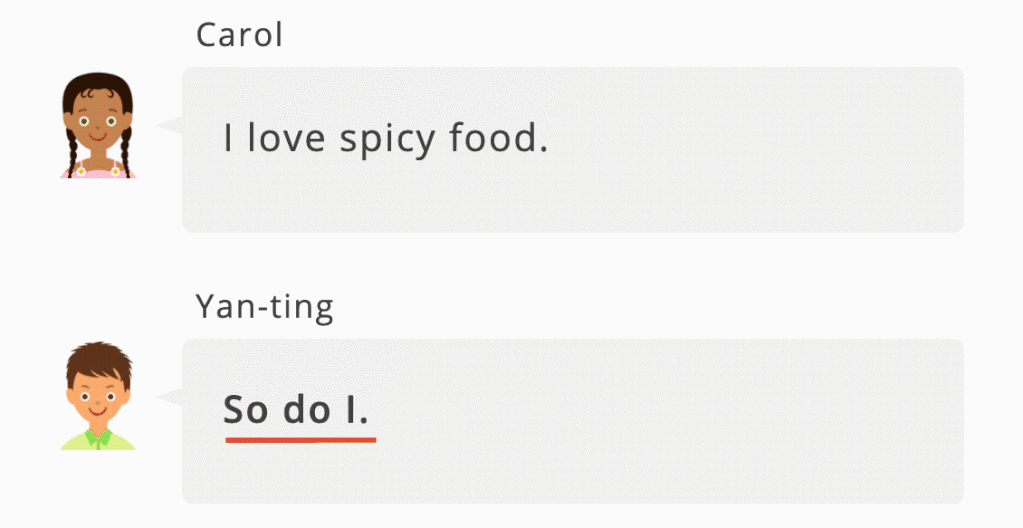How to Use “So Am I” and “So Do I” Like a Native Speaker [Updated]
![How to Use “So Am I” and “So Do I” Like a Native Speaker [Updated] How to Use “So Am I” and “So Do I” Like a Native Speaker [Updated]](https://assets.blog.engoo.com/wp-content/uploads/sites/9/2021/09/21054031/so_am_i_so_do_i_cover-1024x684.jpg)
“So do I.”
“So have I.”
“So am I.”
Native speakers use these phrases often, so you've probably heard them before. But what makes them different? And do they mean the same thing as “Me too”?
This article will explain them in detail so you can use them yourself in your own English conversations!
So ... I.
Basically, all phrases that start with “So” and end with “I” mean “Me too.”

If you have trouble understanding the dialogues above, just replace the “So ... I” phrases with “Me too.” They mean the same thing and are both used in formal and casual English.
But how do these phrases mean the same thing? Well, “so” is a word English speakers often use to avoid repeating things.
Just think about phrases like “I think so.” If someone asks "Do you think it will be hot today?", it's simpler to reply with "I think so" than "I think it will be hot today."
The same applies when you’re agreeing with the statement “I love spicy food.” Instead of saying “I love spicy food too,” you can simply say “So do I.”’
Why is “I” at the End of the Sentence?
You probably learned that English sentences start with the subject. So why is “I” at the end of “So … I”?
This probably isn’t the first time you’re seeing normal English sentence structure inverted (switched around). For example, when you ask someone “Where are you?” that’s also an inversion of normal sentence structure (“You are … ”).
The process for inverting sentences for “So … “ is similar to the process of inverting a sentence to change it into a question. If the verb in the sentence is “to be” or a modal verb, keep it.
- I am busy. → So am I.
- I can speak English. → So can I.
- I will be there. → So will I.
- If I won the lottery, I would buy a mansion. → So would I.
If the sentence contains some other verb, simply replace it with “do.”
- I love spicy food. → So do I.
- I go jogging every day. → So do I.
- I eat a lot for breakfast. → So do I.
- I have twenty dollars in my pocket. → So do I.
Just make sure to pay attention to verb tense.
- I loved spicy food when I was a kid. → So did I.
- I’ve been sick recently. → So have I.
When to Use “So … I” Instead of “Me Too”

You might be wondering when you should use “So … I'' instead of “Me too.” After all, “Me too” is simpler and means the same thing, so it makes sense to use it whenever you can, right?
Well, there are two situations when “Me too” can’t be used.
1. As part of a longer sentence
Unlike “Me too,” “So do I” can be part of a longer sentence. For example, if you wanted to combine the sentences “Jay likes dogs” and “I like dogs too,” you could say one of the following:
- Jay likes dogs, and so do I.
- Jay likes dogs, and I do too.
The sentence "Jay likes dogs and me too," however, sounds unnatural. In addition, it's unclear because it could mean something different: “Jay likes dogs and he likes me too.”
2. With other pronouns
While the phrase “Me too” is very convenient, it only works for the pronoun “me.” You can’t say “He too” or “They too.” Instead, you’ll either need to include a verb (“He does too.”) or use the “So + [verb] + [pronoun]” structure.
- Jay likes dogs, and my sister does too.
- Jay likes dogs, and so does my sister.
Here are some more examples:
- I’ve been to China before, and so has my sister.
- I can speak Italian. So can my friend Bill.
- I'm hungry, and so are they.
- A: I think that’s a great idea. / B: So do we.
Responding to “I Love You.”
One important thing to remember when using these phrases is the correct way to respond when talking about loving another person.
If someone says that they love pizza, for example, you can say either "Me too" or "So do I" to agree. However, if someone says "I love you," those same responses mean that you also love yourself!
If you want to express your love for your partner, you would say, "I love you too."
Bonus: “Neither ... I”
While we’re on this topic, let’s also go over “Neither … I” – the negative version of “So … I.” It means “Me neither” and you use it when agreeing with negative statements.
- I don’t speak German. → Neither do I.
- I’ve never had a pet before. → Neither have I.
- I’m not a fan of pizza. → Neither is my mom.
Remember that only "Neither …" responses are appropriate in these examples; using "Me too" would be incorrect grammar.
Wrap-up
Want to get some practice using these phrases in a real conversation? Book a lesson with an Engoo tutor and have a chat! We also have a grammar lesson on “So/Neither do I” that you can study together. Give it a try!



